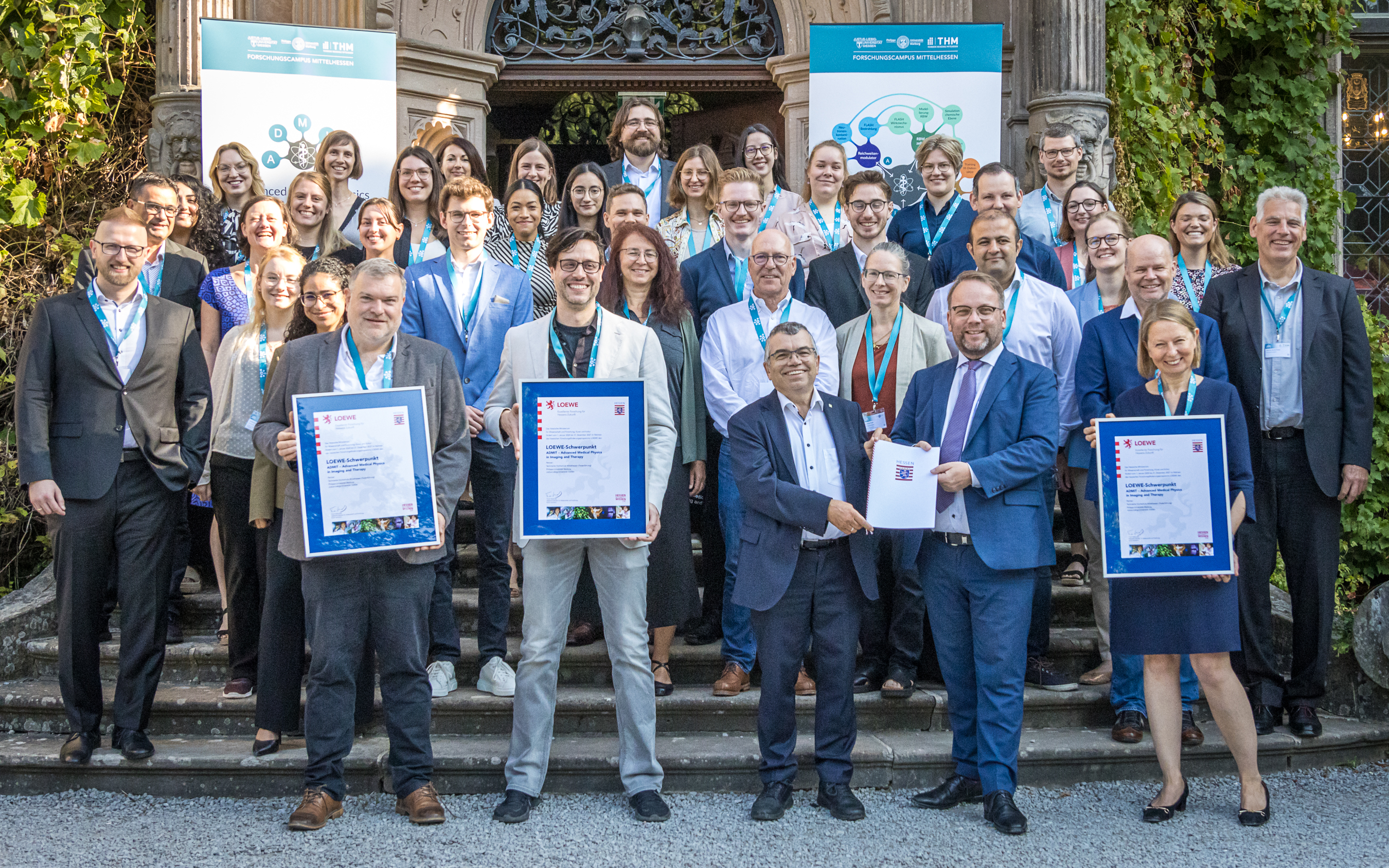Fighting cancer and Parkinson's with medical physics
Cancer and neurodegenerative diseases are among the greatest health and social challenges of today. Under the leadership of the THM the three universities in Central Hesse have been working together on innovative medical physics approaches in the LOEWE Research Cluster ADMIT (Advanced Medical Physics in Imaging and Therapy) since the beginning of the year in order to meet these challenges. At the opening symposium of the research network at Rauischholzhausen Castle, Hesse's Science Minister Timon Gremmels spoke of a “unique opportunity to improve the lives of many people”.
The aging societies of industrialized nations are particularly affected by cancer and neurodegenerative diseases such as Parkinson's. The World Health Organization (WHO) predicts a steady increase in these diseases, which are among the most common causes of death in the Western world. The project by the University of Applied Sciences ( THM ), Philipps University of Marburg (UMR) and Justus Liebig University of Gießen (JLU) brings together research efforts from radiology, oncology and neurology for early detection and improved therapy under the umbrella of medical physics. The project is part of a network of national and international collaborations, including with Harvard University, Yale University and the University of Pennsylvania as well as leading global medical technology companies.
“We would like to use new medical-physical methods to improve image-guided therapies and make them more patient-friendly,” explained Prof. Dr. Boris Keil from the Institute for Medical Physics and Radiation Protection at the Life Science Engineering Department at THM . Keil is the scientific coordinator of the project, together with Prof. Dr. Susanne Knake from the Department of Medicine at the Philipps University of Marburg, also deputy director of the Clinic for Neurology at the University Hospital Gießen -Marburg. Working groups led by Prof. Dr. Klemens Zink and Prof. Dr. Martin Fiebich from THM, Prof. Dr. Rita Engenhart-Cabillic, Prof. Dr. Sebastian Adeberg, Prof. Dr. Andreas Mahnken from the Department of Medicine at Philipps University and the University Hospital as well as from the Justus Liebig University under Prof. Dr. Kai Thomas Brinkmann are also involved. The consortium is supplemented by two junior groups, led by Dr. Kilian Baumann ( THM ) and PD Dr. Ulrike Theiß (UMR).
The first symposium at Rauischholzhausen Castle, whose keynote speech was given by Prof. Dr. Joao Seco from the German Cancer Research Center, was primarily used to get to know each other and to have an intensive exchange between the five sub-areas spread across the three universities. Science Minister Timon Gremmels also traveled to officially hand over the LOEWE certificates: “In Central Hesse, application-oriented research is traditionally particularly strong and I am very pleased that the pioneering field of medical physics, ADMIT, has now been included in the LOEWE programme “. LOEWE, the “State Offensive for the Development of Scientific-Economic Excellence”, is the Hessian programme to promote cutting-edge research. The approved project is part of the 16th funding phase and will be funded with 4.8 million euros from LOEWE funds from January 2024 to December 2027. Keil was also awarded a five-year LOEWE transfer professorship worth one million euros in order to transfer the results of his research into everyday clinical practice. Minister Gremmels also emphasized how important this is for all patients.
He emphasized that a special feature of ADMIT is that a university of applied sciences (HAW) is responsible for the scientific leadership of a LOEWE Research Cluster. “Especially with such a complex and interdisciplinary topic, this is an outstanding award for a HAW. “It became clear to everyone involved during the assessment that the THM is excellently positioned for this,” he praised. THM President Prof. Dr. Matthias Willems passed this praise on to the researchers involved: professional excellence meets enthusiasm for the common goal. The cooperation creates synergies for high-quality research. “Central Hesse is a globally unique and leading research location in interdisciplinary applied medical physics,” said Willems with conviction.
ADMIT brings together the existing, scientifically unique basic structure of the region. The Research Campus of Central Hessen (FCMH) serves as an institutionalized cooperation platform for research, promoting young talent and infrastructure management. All those involved emphasized that the long-standing, good and resilient cooperation between the Central Hessian universities, established by the FCMH, enables ADMIT to create scientific added value that is otherwise only conceivable in large research centers.
Prof. Dr. Susanne Knake explained the clinical goals of the highly interdisciplinary team of leading medical physicists and physicians: “In the case of diseases of the nervous system and cancer, early diagnosis and individual treatment concepts for each patient lead to improved therapy. New imaging and computer-aided procedures, which we are researching together in an interdisciplinary team at ADMIT, help us here.” This is possible through the use of synergies that only exist in the region. In addition to the scientific and clinical goals, it is also the task of the LOEWE Research Cluster to create international visibility for the science location of Central Hesse and to raise local research in the field of applied medical physics to a new level.

